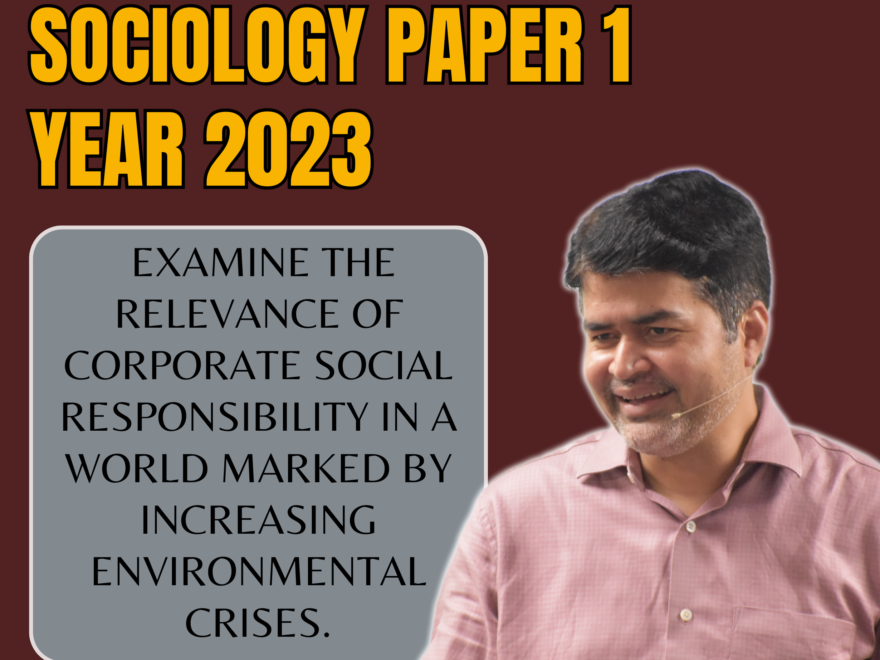Examine the relevance of Corporate Social Responsibility in a world marked by increasing environmental crises.
Section: A.
Sociology Paper 2023 Analysis.
Relevant for Paper 1: Unit 10 social change in Modern society
Question 5 (A): Examine the relevance of corporate social responsibility in a world marked by increasing environmental crises.
(10 Marks)
|
Introduction: Explain the concept of Corporate Social Responsibility (CSR) in brief Main Body: Explain the relevance of Corporate Social Responsibility (CSR) using various perspectives like functionalist, feminists, reflexivity and risk society Conclusion: Need for genuine steps for goal attainment by mobilising the motivation of corporates |
Introduction:
Corporate Social Responsibility (CSR) refers to the ethical conduct of a corporation towards society. It implies that corporations should not only be concerned about profit-making but also the welfare of society and the environment. With the increasing environmental crises worldwide, the relevance of CSR is more significant than ever. Ecological modernization theory highlights that markets and economic agents should modify their action to introduce incentives for environmentally benign outcomes
Main body:
- Many corporations have significant environmental footprints due to their operations, such as manufacturing, mining, and energy production. From functionalist viewpoint Corporate Social Responsibility (CSR) plays a role in promoting social cohesion by demonstrating that corporations are willing to address the collective concern of environmental degradation. This fosters a sense of solidarity among stakeholders, reinforcing the moral fabric of society and it helps in preventing the conflict in society and maintaining social order.
- An example of this is the Indian multinational conglomerate Tata Group, which has implemented numerous CSR initiatives focused on environmental sustainability. These include water conservation projects, afforestation drives, and efforts to reduce carbon emissions.
- Anthony Giddens’ theory of “reflexive modernity” suggests that individuals and institutions must adapt and change in response to environmental challenges. Corporate Social Responsibility (CSR) can be viewed as an expression of reflexive modernity within corporations, where they recognize the need to adapt their practices to address environmental concerns, while also ensuring their own sustainability.
- Schimberg says that the industrial capitalism sets societies on a treadmill of production leading to environmental damage, using up natural resources at a rapid rate and generating high level of pollution and waste. Hence it puts a responsibility on the part of corporates to take action to solve the crises .
- Ulrich Beck’s theory of the “Risk Society” argues that modern industrial societies are characterized by unprecedented risks, including environmental risks. In this context, (Corporate Social Responsibility) CSR can be seen as a response to the risks associated with environmental crises. Corporations engage in CSR to manage and mitigate risks, as well as to gain social acceptance and reduce the potential for societal unrest resulting from environmental harm.
- Marxist perspectives highlight the role of corporations in perpetuating social inequalities and exploiting natural resources. In the context of environmental crises, CSR can be seen as an attempt by corporations to mitigate the negative consequences of their actions on marginalized communities and the environment. It can be viewed as a response to potential social unrest and a way to legitimize corporate power.
Some criticism of CSR highlighting the gaps
- However Subaltern sociologists argue that Corporate Social Responsibility (CSR) fund is not used for tribal rehabilitation, small and marginal farmers or to mitigate draughts or crop damage due to extreme weather events and CSR funds are mostly used in urban or semi urban areas.
- Feminist sociologists argue that Corporate Social Responsibility (CSR) funds rarely consider female perspectives on environmental mitigation Sylvia Walby argues that environmental crisis has different impact on women as women are among the most affected social group by environment catastrophe.
Conclusion:
While CSR presents an avenue for corporations to align with societal values, manage risks, and foster social cohesion, its effectiveness hinges on the genuine commitment of businesses to sustainable and responsible practices, emphasizing the pressing need for corporate motivation towards meaningful goal attainment along with fostering the concerns of various sections of society.
Related Blogs…
To master these intricacies and fare well in the Sociology Optional Syllabus, aspiring sociologists might benefit from guidance by the Best Sociology Optional Teacher and participation in the Best Sociology Optional Coaching. These avenues provide comprehensive assistance, ensuring a solid understanding of sociology’s diverse methodologies and techniques.
META TAGS:
Iron Law of Oligarchy, Robert Michels, Vilfredo Pareto, Lions and Foxes theory, power dynamics, organizational oligarchy, elite circulation, political sociology, leadership styles, organizational control, sociological theories, political maneuvering, elite differentiation, power concentration, societal stability, political leadership, strategic political leadership, Sociology Question Paper, Sociology Question Paper 2023, Sociology Question Paper CYQ, Sociology Question Paper UPSC, What, according to Robert Michels, is the iron law of oligarchy? Do lions and foxes in Vilfredo Pareto’s theory, essentially differ from each other? Substantiate.
Why Vikash Ranjan’s Classes for Sociology?
Proper guidance and assistance are required to learn the skill of interlinking current happenings with the conventional topics. VIKASH RANJAN SIR at TRIUMPH IAS guides students according to the Recent Trends of UPSC, making him the Best Sociology Teacher for Sociology Optional UPSC.
At Triumph IAS, the Best Sociology Optional Coaching platform, we not only provide the best study material and applied classes for Sociology for IAS but also conduct regular assignments and class tests to assess candidates’ writing skills and understanding of the subject.
Choose The Best Sociology Optional Teacher for IAS Preparation?
At the beginning of the journey for Civil Services Examination preparation, many students face a pivotal decision – selecting their optional subject. Questions such as “which optional subject is the best?” and “which optional subject is the most scoring?” frequently come to mind. Choosing the right optional subject, like choosing the best sociology optional teacher, is a subjective yet vital step that requires a thoughtful decision based on facts. A misstep in this crucial decision can indeed prove disastrous.
Ever since the exam pattern was revamped in 2013, the UPSC has eliminated the need for a second optional subject. Now, candidates have to choose only one optional subject for the UPSC Mains, which has two papers of 250 marks each. One of the compelling choices for many has been the sociology optional. However, it’s strongly advised to decide on your optional subject for mains well ahead of time to get sufficient time to complete the syllabus. After all, most students score similarly in General Studies Papers; it’s the score in the optional subject & essay that contributes significantly to the final selection.
“A sound strategy does not rely solely on the popular
Opinion of toppers or famous YouTubers cum teachers.”
It requires understanding one’s ability, interest, and the relevance of the subject, not just for the exam but also for life in general. Hence, when selecting the best sociology teacher, one must consider the usefulness of sociology optional coaching in General Studies, Essay, and Personality Test.
The choice of the optional subject should be based on objective criteria, such as the nature, scope, and size of the syllabus, uniformity and stability in the question pattern, relevance of the syllabic content in daily life in society, and the availability of study material and guidance. For example, choosing the best sociology optional coaching can ensure access to top-quality study materials and experienced teachers. Always remember, the approach of the UPSC optional subject differs from your academic studies of subjects. Therefore, before settling for sociology optional, you need to analyze the syllabus, previous years’ pattern, subject requirements (be it ideal, visionary, numerical, conceptual theoretical), and your comfort level with the subject.
This decision marks a critical point in your UPSC – CSE journey, potentially determining your success in a career in IAS/Civil Services. Therefore, it’s crucial to choose wisely, whether it’s the optional subject or the best sociology optional teacher. Always base your decision on accurate facts, and never let your emotional biases guide your choices. After all, the search for the best sociology optional coaching is about finding the perfect fit for your unique academic needs and aspirations.
Follow us :
🔎 https://www.instagram.com/triumphias
🔎 https://www.youtube.com/c/TriumphIAS
🔎 https://t.me/VikashRanjanSociology
Find More Blogs…
| Compare and contrast Karl Marx’s and Max weber’s | Karl Marx- Historical Materialism |
| Position of Women In the Modern Indian Society | Sociology: Social system and pattern variables |
KEYWORD:
Corporate social responsibility, Environmental crises, Relevance of CSR, Functionalism, Feminism, Reflexivity, Risk society, Genuine commitment, Sustainable practices, Goal attainment


